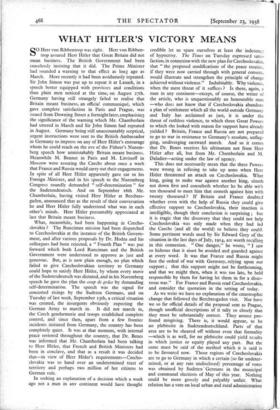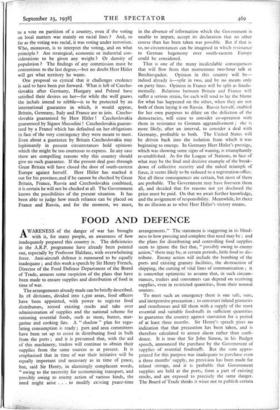WHAT HITLER'S VICTORY MEANS
SO Herr von Ribbentrop was right. Herr von Ribben- trop assured Herr Hider that Great Britain did not mean business. The British Government had been ceaselessly insisting .that it did. The Prime Minister had sounded a warning to that effect as long ago as March. More recently it had been assiduously repeated. Sir John Simon was put up to repeat it at Lanark, in a speech better equipped with provisoes and conditions than plain men noticed at the time, on August 27th. Germany having still strangely failed to realise that Britain meant business, an official communiqué, which gave complete satisfaction in Paris and Prague, was issued from Downing Street a fortnight later, emphasising the significance of the warning which Mr. Chamberlain had uttered in March and Sir John Simon had repeated in August. Germany being still unaccountably sceptical, urgent instructions were sent to the British Ambassador in Germany to impress on any of Herr Hitler's entourage whom he could reach on the eve of the Fiihrer's Nurem- berg speech how unmistakably Britain meant business. Meanwhile M.. Bonnet in Paris and M. Litvinoff in Moscow were assuring the Czechs about once a week that France and Russia would carry out their engagements. In spite of all Herr Hitler apparently gave ear to his Foreign Minister, and in his speech to the Nuremberg Congress roundly demanded " self-determination " for the Sudetendeutsch. And on September 16th Mr. Chamberlain, having visited Herr Hitler at Berchtes- gaden, announced that as the result of their conversation he and Herr Hider fully understood what was in each other's minds. Herr Hitler presumably appreciated at last that Britain meant business.
What, meanwhile, had been happening in Czecho- slovakia ? The Runciman mission had been dispatched to Czechoslovakia at the instance of the British Govern- ment, and after various proposals by Dr. Hodza and his colleagues had been rejected, a " Fourth Plan " was put forward which both Lord Runciman and the British Government were understood to approve as just and generous. But, as is now plain enough, no plan which failed to give Czechoslovakian territory to Germany could hope to satisfy Herr, Hitler, by whom every move of the Sudetendeutsch was dictated, and in his Nuremberg speech he gave the plan the coup de grace by demanding self-determination. The speech was the signal for concerted risings by the Sudeten Germans, and on Tuesday of last week, September 13th, a critical situation was created, the insurgents obviously expecting the German Army to march in. It did not march in, the Czech gendarmerie and troops established complete control, and since then, apart from a few frontier incidents initiated from Germany, the country has been completely quiet. It was at that moment, with internal peace restored throughout the country, that Dr. Benes was informed that Mr. Chamberlain had been talking to Herr Hitler, that French and British Ministers had been in conclave, and that as a result it was decided that—in view of Herr Hitler's requirements—Czecho- slovakia was to hand over an undetermined tract of territory and perhaps two million of her citizens to German rule.
In seeking an explanation of a decision which a week ago not a man in any continent would have thought credible let us spare ourselves at least the indecency of hypocrisy. The Times on Tuesday expressed satis- faction, in connexion with the new plan for Czechoslovakia, that " the proposed modifications of the peace treaties, if they were now carried through with general consent, would illustrate and strengthen the principle of change achieved without violence." Indubitably. Why violence, when the mere threat of" it suffices ? Is there, again, a man in any continent—except, of course, the writer of the article, who is unquestionably an honourable man -who does not know that if Czechoslovakia abandons a plan of settlement which all the world outside Germany and Italy has acclaimed as just, it is under the threat of ruthless violence, to which three Great Powers to which she looked with reason for support have already yielded ? Britain, France and Russia are not prepared to go to war in resistance to Germany's resolute, unflag- ging, undiverging eastward march. And so it comes that Dr. Benes receives his ultimatum not from Herr Hitler after all, but from Mr. Chamberlain and M. Daladier—acting under the law of agency.
This does not necessarily mean that the three Powers were wrong in refusing to take up arms when Herr Hider threatened an attack on Czechoslovakia. What king, going to make war against another king, sitteth not down first and consulteth whether he be able with ten thousand to meet him that cometh against him with twenty thousand ? If Britain and France doubted whether even with the help of Russia they could give effective support to Czechoslovakia, their inaction is intelligible, though their conclusion is surprising ; but it is tragic that the discovery that they could not help Czechoslovakia • was only made when they had led the Czechs (and all the world) to believe. they could. Some pertinent words used by Sir Edward Grey of the situation in the last days of July, 1914, are worth recalling in this connexion. " One danger," he wrote, " I saw so hideous that it must be avoided and guarded against at every word. It was that France and Russia might face the ordeal of war with Germany, relying upon our support ; that this support might not be forthcoming, and that we might then, when it was too late, be held responsible by them for having let them in for a disas- trous war." For France and Russia read Czechoslovakia, and consider_ the quotation in the setting of today.
As we write we have no explanation of the catastrophic change that followed the Berchtesgaden visit. Nor have we so far official details of the proposal sent to Prague, though unofficial descriptions of it tally so closely that they must be substantially correct. They arouse pro- found misgiving. There is, it would appear, to be no plebiscite in Sudetendeutschland. Parts of that area are to be sheared off without even that formality —which is as well, for no plebiscite could yield results in which justice or equity played any. part. But the same must be said of the method which it is said is to be favoured now. Those regions of Czechoslovakia are to go to Germany in which a certain (so far undeter- mined, or at any rate undisclosed) percentage of votes was obtained by Sudeten • Germans in the municipal and communal elections of May of this year. Nothing could be more grossly and palpably unfair. What relation has a vote on local urban and rural administration to a vote on partition of a country, even if the voting on local matters was mainly on racial lines ? And, so far as the voting was racial, it was voting under terrorism. Who, moreover, is to interpret the voting, and on what principle ? Are strategical, economic or industrial con- siderations to be given any weight ? Or density of population ? The findings of any commission must be contentious to the last degree,—but no doubt Herr Hitler will get what territory he wants.
One proposal so cynical that it challenges credence is said to have been put forward. What is left of Czecho- slovakia after Germany, Hungary and Poland have satisfied their desires on her—for while the wolf gnaws the jackals intend to nibble—is to be protected by an international guarantee in which, it would appear, Britain, Germany, Italy and France are to join. Czecho- slovakia guaranteed by Herr Hitler ! Czechoslovakia guaranteed by Signor Mussolini ! Czechoslovakia guaran- teed by a France which has defaulted on her obligations in face of the very contingency they were meant to meet. Even about a guarantee by Britain Czechoslovakia may legitimately in present circumstances hold opinions which she might be too courteous to express. In any case there are compelling reasons why this country should give no such guarantee. If the present deal goes through Great Britain will have closed the door of south-eastern Europe against herself. Herr Hitler has marked it out for his province, and if he cannot be checked by Great Britain, France, Russia and Czechoslovakia combined, it is certain he will not be checked at all. The Government knows the possibilities of the present situation. It has been able to judge how much reliance can be placed on France and Russia, and for the moment, we must, in the absence of information which the Government is unable to impart, accept its declaration that no other course than has been taken was possible. But if that is so, no circumstances can be imagined in which resistance to German hegemony over south-eastern Europe could be considered.
That is one of the many incalculable consequences that will flow from that momentous two-hour talk at Berchtesgaden. Opinion in this country will be— indeed already is—split in two, and by no means only on party lines. Opinion in France will be split as funda- mentally. Relations between Britain and France will suffer a serious strain, for each will tend to lay the blame for what has happened on the other, when they are not both of them laying it on Russia. Russia herself, enabled for her own purposes to dilate on the defection of the democracies, will cease to consider co-operation with them in resistance to German aggrandisement ; she is more likely, after an interval, to consider a deal with Germany, profitable to both. The United States will be driven back into the isolation from which it was beginning to emerge. In Germany Herr Hitler's prestige, which was showing some signs of waning, is triumphantly re-established. As for the League of Nations, in face of what may be the final and decisive example of the break- down of collective security and the naked triumph of force, it seems likely to be reduced to a registration-office. Not all these consequences are certain, but most of them are probable. The Government may have foreseen them all, and decided that for reasons not yet disclosed the price must be paid. On that we await further knowledge, and the assignment of responsibility. Meanwhile, let there be no illusion as to what Herr Hitler's victory means.







































 Previous page
Previous page